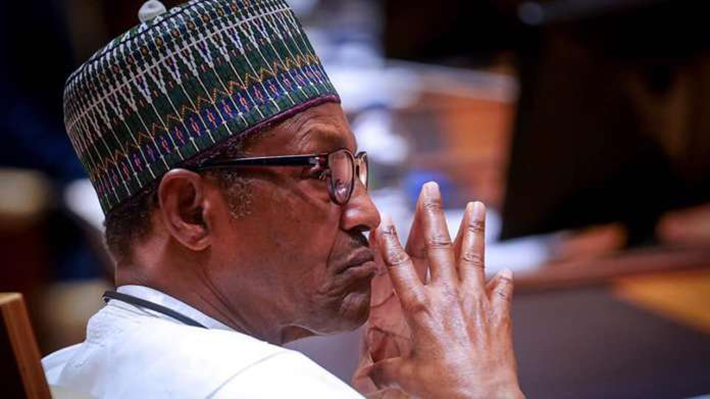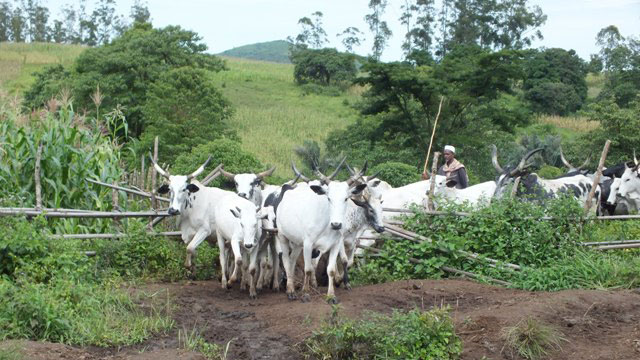Buhari’s agric policy packs no punch

Olawale Adebanwi has long dreamt of managing a sprawling farmland, so he wasted no time in pursuing agriculture when he heard President Buhari speak passionately about his dedication to the sector.
“I was even more confused knowing that the president himself has a ranch for cattle and other livestock,” Mr. Adebanwi tells Peoples Gazette. “A ranch is a form of agriculture.”
The economics graduate says he “harassed” his uncle to secure a piece of land for him to farm vegetables in Ajebandele, a border community between Ondo and Ogun.
“And I immediately dedicated all my time and resources to it,” he says.
It was within the first seven months that he realised that Mr. Buhari’s admin has no coherent policy on agriculture, much less releasing any significant funding for the sector.
“There is no fertiliser, little loans that are available have been politicised and access to them restricted to a few connected people who may not even put it in the sector,” he says.
The 39-year-old says he was lucky not to have taken any bank loans when he tried farming in 2017 on the back of the president’s advice.
“Make no mistake, I am not the only person who had this horrible experience in the sector,” Mr. Adebanwi says.
While he admits there are success stories in the sector, he estimates they are too few and concentrated in an agric sub-sector to be used as an inspiration.
“A few rice farmers are saying they are doing fine based on the anchor-borrower’s idea,” he says. “But only a few of those who go into agriculture do so to farm rice.”
Rhetoric and reality
The Buhari administration has regularly touted its relentless efforts towards shifting focus to agriculture to diversify Nigeria’s mono-product economy and satisfy demand for local food consumption.

Earlier this month, the president asked the youth to go into agriculture as a means of economic prosperity.
But coming in an era of quantum technology and services, the president’s statement drew a collective backlash from Nigerians.
Declining agricultural productivity (20 percent drop since 2014) occasioned by low government investment in the sector has stunted the objectives of a hunger-free country.
Food shortages, aggravated by rising inflation, are becoming severe across the country.
Smallholder farmers continue to experience a reduction in crop yields due to the failure of agricultural research institutes to provide them with the right technology to enhance productivity, Peoples Gazette understands.
Ahmed Benjamin, an agricultural economics professor at ABU Zaria, says Nigeria’s rising food insecurity is due to underfunding of the agric sector.
He tells the Gazette that what administration officials are propagating in the open does not reflect the harsh reality of the sector.
Farmers continue to bear the brunt of the ailing sector as they sparingly receive support from the Federal Government.
“Huge sums of money have been announced, but, at the farmer levels, they may not be able to say much about getting benefits or support from the federal government,” the expert said. “Even the research institutes will tell you, they have not gotten much for research or for supporting extension work with farmers.”
Almost 90 percent of the annual earmarks for research institutes in the country could only cover salaries and overhead, leaving a paltry 10 percent, the Gazette’s findings show.
Nearly one year after Sabo Nanono, minister of agriculture, vowed to revamp the largely incapacitated research institutes, no changes have been recorded.
“We must rationalise research institutes and make it more cost-effective and more productive if we are going to achieve our goal”, he said.
Investments in Agriculture low under Buhari
Funding for agriculture has not improved under the Buhari administration, despite the president’s perception of the sector as a veritable tool to economic recovery.

With 1.73 percent of the 2020 budget earmarked for agriculture, the Nigerian government continues to fall short of the global benchmark of 10 percent as recommended by the African Union’s Maputo Declaration of 2003.
A review of the Africa Agricultural Transformation Scorecard released in February 2020 detailed Nigeria’s underperformance in enhancing investment in agriculture.
The scorecard, presented at the 2020 AU Summit in Addis Ababa, also highlights Nigeria’s inability to end hunger and curtail poverty through agriculture by 2025.
Okosor Oyere, an official of the Federal Ministry of Agriculture and Rural Development (FMARD), laments that “inadequate capital funding resulted in huge outstanding liabilities committed on critical projects” in 2019.
The Gazette learnt that 1.50 percent of the country’s 2019 budget was set aside for agriculture — a sharp drop from the previous year.
But Ethiopia (whose per capita income stands at $790) has in excess of seven percent of its budgets allocated to agriculture.
Since assuming office in 2015, Mr. Buhari has failed to achieve beyond two percent of the national budget for agriculture.
Act now
A non-governmental organisation, ActionAid Nigeria, also decried the poor funding as worrisome, saying the research sub-sector has been essentially neglected by the administration.
Nigeria’s unemployment index currently stands at 27.1 percent. The World Bank estimates over 90 million Nigerians live in abject poverty and unable to provide enough food for themselves.
Mr. Benjamin and other experts believe agriculture is a viable alternative to Nigeria’s dependence on oil income and demand substantial investments in the sector towards boosting productivity, satisfying local demand for food and flattening the unemployment curve.
We have recently deactivated our website's comment provider in favour of other channels of distribution and commentary. We encourage you to join the conversation on our stories via our Facebook, Twitter and other social media pages.
More from Peoples Gazette

Politics
Katsina youths pledge to deliver over 2 million votes to Atiku
“Katsina State is Atiku’s political base because it is his second home.”

Agriculture
FG distributes concentrates to cattle farmers affected by 2022 floods in Plateau
The director urged the farmers to use the palliatives wisely, adding that they were meant to assist them in boosting their production.

NationWide
Nigeria’s Gbenga Agboola named vice chairman, U.S. Chamber of Commerce’s Africa Business Centre
The U.S. Chamber of Commerce’s Africa Business Centre said Flutterwave’s commitment to strengthening U.S.-Africa ties was the catalyst for Mr Agboola’s appointment.

NationWide
Nigerians must support Tinubu as he ‘works hard’ to address country’s challenges: Governor Ododo
The governor said Mr Tinubu was aware of the strategic implications of any breach of security in Kogi as a gateway state to the North and the South.

Education
We are open to public scrutiny, NELFUND tells Nigerians
The managing director said that NELFUND, under his watch, would not deviate from its sole mandate of giving as many loans as possible to Nigerians in need of them.

Showbiz
Veteran Nollywood actor Ogunjimi is dead
Legendary Yoruba Nollywood actor Ganiyu Oyeyemi, also known as Ogunjimi, has died.

NationWide
FG moves to finalise national intellectual property policy
The NCC boss said the policy would be a blueprint for a more efficient, modern, responsive legal and administrative framework to leverage creative and innovative potential.








